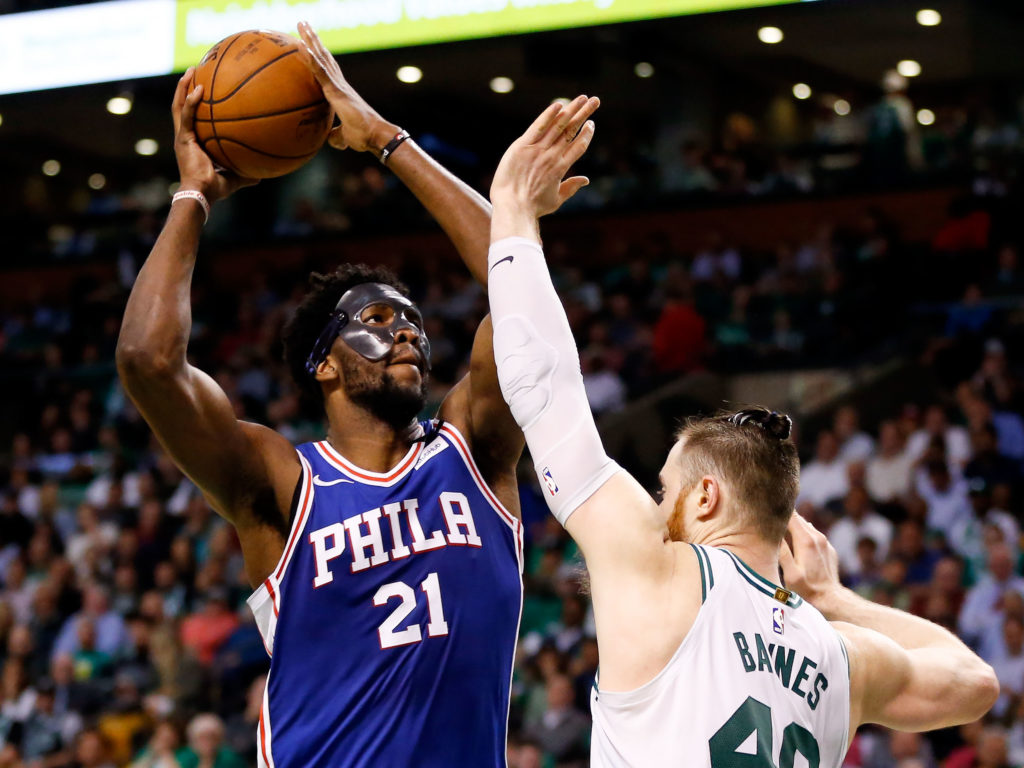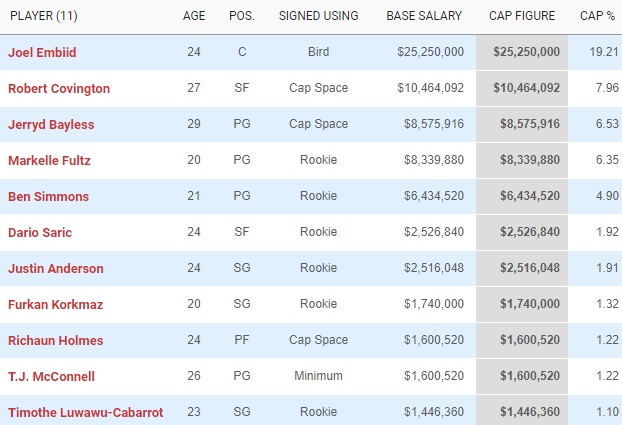Ad Disclosure
Joel Embiid, Rudy Gobert, and the Sixers’ Salary Situation

I’m back.
Kinker has returned from England/Scotland/Ireland/Wales, and while all of those countries were fantastic, nothing compares to the blue collar, lunch-pail carrying, workmanlike city of Philadelphia.
Anyway, Ben Simmons won Rookie of the Year last night. Good for him; he deserved it. The voting wasn’t even close, which surprised me. I thought for sure Donovan Mitchell would have received more first place nods, but I was wrong.
Joel Embiid finished second in Defensive Player of the Year voting, which I do think is fair. Rudy Gobert was fantastic this season, even if he did miss a significant chunk of time through injury. Did he feed on tanking teams during the second half of the year? Maybe, but I think the same could be said of Embiid when the Sixers were trouncing mediocre Eastern Conference squads before he suffered the facial fracture in March. Joel ended up playing 63 games while Gobert featured in 56, so the difference was ultimately negligible, in my mind. Utah was a juggernaut when Gobert returned, going 30-7 over a stretch that began in January and carried into April. The Sixers, of course, won 16 straight to finish the year, a run that included Embiid for about half of that time.
A quick look at the per-36 numbers for each player:
Gobert had better block and steal numbers while committing fewer fouls.
Advanced numbers show he also out-performed Joel in defensive box plus/minus and defensive win shares:
Those numbers carried into the postseason, which you can’t really hold against Joel since he was coming off injury and playing with a mask during his first playoff experience. But Gobert was very good against OKC and Houston, averaging 14 and 11 through rounds one and two. I know the voting takes place before the postseason, but if we’re evaluating the entirety of the year on our own terms, I think Gobert would benefit from his performances in those two series. He also played in the tougher conference against center opposition like Anthony Davis, Steven Adams, Nikola Jokic, and Clint Capela, plus better backcourt players, so I’d certainly take that into consideration. Who’s the best five in the east? It’s certainly not Hassan Whiteside, Jarrett Allen, or Tristan Thompson. Joel’s toughest opponent was probably a stretch Al Horford or maybe Andre Drummond.
The thing that stands out for me, however, is that Embiid did all of that defensive work while also being an offensive linchpin, a guy with a huge usage rate on the other end of the floor. Think about it; he wasn’t just a defensive anchor and a rim protector, he was a guy who also had a significant offensive role on an up-tempo and mobile team. Gobert did not have that responsibility on a team that played a different style with a much different point guard and shooting guard setup.
More important than DPOY is the fact that Joel didn’t hit any of his supermax triggers this season, which were NBA MVP and a first team selection. It means that his salary begins at $25 million next season instead of adding the $5m bonus to move him into the $30 million range.
That’s key to the Sixers’ offseason pursuits, as the salary table now looks like this, courtesy of Spotrac:
The NBA salary cap will be $101 million next season with a $123m luxury tax threshold. The Sixers do not carry any dead money into the campaign but you’re now adding Zhaire Smith and Landry Shamet at around $2.5 million and $1.6 million. Mikal Bridges would have cost ~$3.5 million, since the 10th pick hits the cap higher than the 16th pick, so the Sixers actually saved about a million bucks in salary with that trade.
There’s still a lot of wiggle room here, a number of $74.7 million that leaves about $26 million to work with. They would still be about $9 million short of the $35.3m required to offer LeBron James a 35% supermax, but they can move some pieces around to make it work.
The Jerryd Bayless contract is obviously a big headache right now, and the best way to approach that albatross is to use the stretch provision to divide the cap hit over three seasons. It would reduce his number to around $2.8 million and free up about $5.7 million, which gives you a lot more flex. That’s the most obvious move, but you’re eventually going to run into incomplete roster charges if you try to cut or trade more players without getting someone in return. (In layman’s terms, you can’t just cut players and roll into the season with a 10 man rotation. You have to keep 12 spots filled.)
Beyond that, you’ve got JJ Redick, Marco Belinelli, and Ersan Ilyasova to think about. Redick can’t come back on $22 million, but would you give him 3 years at $15 million each? Or do you trust Markelle Fultz to be the guy? That might be the more pressing issue at the moment, vs. the pursuit of a max free agent.
Either way, don’t sleep on the $5 million the Sixers save from Embiid not hitting those triggers. It doesn’t seem like much on the surface, but could be the difference between signing a superstar free agent vs. just another guy.
Kevin has been writing about Philadelphia sports since 2009. He spent seven years in the CBS 3 sports department and started with the Union during the team's 2010 inaugural season. He went to the academic powerhouses of Boyertown High School and West Virginia University. email - k.kinkead@sportradar.com
